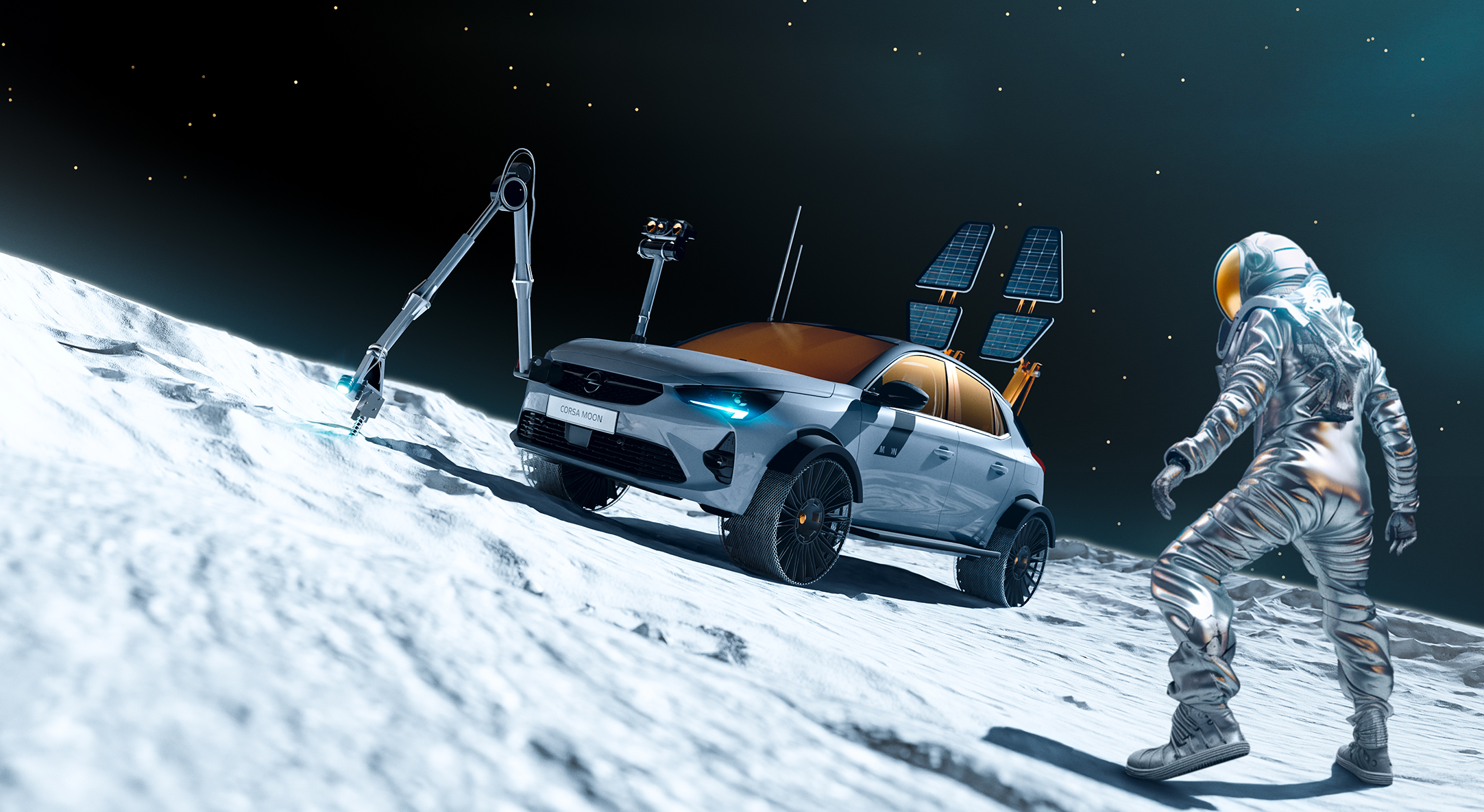Space, the final frontier – for many years, this was the common conception. However, today, with space tourism becoming increasingly likely, it is time to address the mobility needs of extra-terrestrial exploration and Opel is once again pioneering this new era. The brand has just released advanced information and images of its new space mobility concept: the Opel Corsa Moon II. The brand with the Blitz will be the first mobility provider to start to offer tourism on the moon as of mid-decade, once again sticking to its credo of making innovations accessible to everyone.
Get electrified for the space-age
Consequently, Opel’s lunar vehicle is based on the German brand’s best-selling battery-electric Corsa-e . The Corsa Moon II is equipped with space-age technologies to offer the optimum balance between ride comfort, reliability and moon driving performance. Based on the extensive knowledge gathered with the 1997 Corsa Moon concept car, the Opel R&D team identified solar energy as one of the best options for powering a lunar vehicle. Built-in solar cells efficiently will power the 500-kWh battery of the Corsa Moon II in a sustainable way. The Corsa Moon II can cover up to 7,000 km in the ULTP (Universe-wide harmonised Light-duty vehicles Test Procedure) cycle on a single charge of the battery.
.
Opel’s space-age ambitions began with the first Corsa Moon, presented in 1997 as design concept based on the second-generation Corsa.

Opel’s space vehicle is the first to introduce the new adaptive Intelli-Lux® Laser Light. The high-intensity laser headlamps react faster, with more precision than ever before, providing optimum visibility for the moon’s surface. In each headlight, small laser modules generate adaptive light beams that act as a spotlight extending several thousand metres. The Opel laser headlights light up surfaces to 1,000 times stronger than the light produced by terrestrial LED technology, while only using a fraction of the power.
Extra-terrestrial chassis
The airless, durable space tyres are another key innovation of Opel’s space tourism concept car. The woven mesh wheels of the Corsa Moon II ensure extraordinary grip on extra-terrestrial surfaces and will never puncture thanks to highly-elastic yet strong nickel titanium materials. In addition, the raised chassis of the Corsa Moon II provides enough ground clearance for the rugged lunar terrain.
“With our revolutionary Opel Corsa Moon II, we are once again crossing new frontiers and focussing on sustainable mobility solutions.”
– Quentin Huber, Head of Marketing at Opel –
In the interior, space explorers are treated to the Pure Panel Space, a high-tech cockpit that is both fully digital and yet focussed. The “detoxed” cockpit is tailored for moon explorations and lunar tourism and will feature a razor-sharp, high-contrast pillar-to-pillar display spanning the entire windshield. It provides the latest digital technologies and the most important information for the driver, for example energy management. For streamlined human and robotic exploration on the planet, the Corsa Moon II interacts with geostationary satellites and allows intuitive communication with other moon explorers.
“Crossing new frontiers”
“With our revolutionary Opel Corsa Moon II, we are once again crossing new frontiers and focussing on sustainable mobility solutions. The Corsa Moon development project aims to bring moon exploration a significant step towards the ultimate goal of a long-term presence on the moon,” said Quentin Huber, Head of Brand Marketing at Opel. Throughout the more than 40 years lifetime of the Opel Corsa, well over 14 million units have been built. Every single generation of the Corsa has driven and continued the democratisation of individual mobility. Opel’s space-age ambitions began with the first Corsa Moon, presented in 1997 as design concept based on the second-generation Corsa.
April 2023
